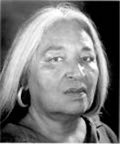Patricia Locke, Tawacin WasteWin, she of good consciousness –compassionate woman, was born in Idaho, a Standing Rock Sioux-Hunkpapa Lakota, and Mississippi Band of White Earth Chippewa. She received her college education at the University of California at Los Angeles and became a world-renowned educator, making her home at the Standing Rock Lakota Reservation in South Dakota.
During her more than 40 years as an educator, Native American languages and culture were suppressed by official schools that served indigenous peoples. She worked tirelessly to change that situation, becoming a preserver of the languages, cultures and spiritual traditions of Native Americans and other indigenous peoples. Serving as an instructor, curriculum designer and executive of the International Native Languages Institute, she influenced changes in Federal law, helped organize 17 tribally run Lakota colleges and was recognized for her creative and indefatigable efforts by being awarded a MacArthur Foundation Fellowship in 1991. She served as President of the National Indian Education Association, as Chair of the American Indian Advisory Committee of the Martin Luther King, Jr. Holiday Commission, wrote a regular column for the Lakota Times, “Unlocking Education,” wrote or contributed to more than two dozen published articles, and served as a member of many advisory boards of organizations dedicated to social justice, human rights and environmental issues.
Patricia Locke developed policies, procedures and education codes for Indian communities in several regions of the country. She co-chaired the United States Department of Interior Task Force on Indian Education Policy and helped develop a Bureau of Indian Affairs Mission Statement and policies that were written into statute.
She was an active advocate for the American Indian Religious Freedom Act of 1978, which guaranteed Native Americans the right to freely practice their spiritual traditions,
and was a strong voice for tribal independence in deciding how and what Native American children should study. She became instrumental in starting Native American run colleges and developing educational curricula on reservations across the country.
She taught and lectured at UCLA, San Francisco State University, Alaska Methodist University, the University of Colorado, and the University of Southern Maine. She was active internationally at the World Assembly of First Nations in Canada (1982), Chair of the Indigenous Women’s Caucus at Beijing (1995), and among the speakers at the Parliament of World Religions, Cape Town, South Africa (1999). Late in her life, Patricia Locke accepted the Baha”i faith and became the first Native American woman to be elected to an office of the National Spiritual Assembly (1993).

